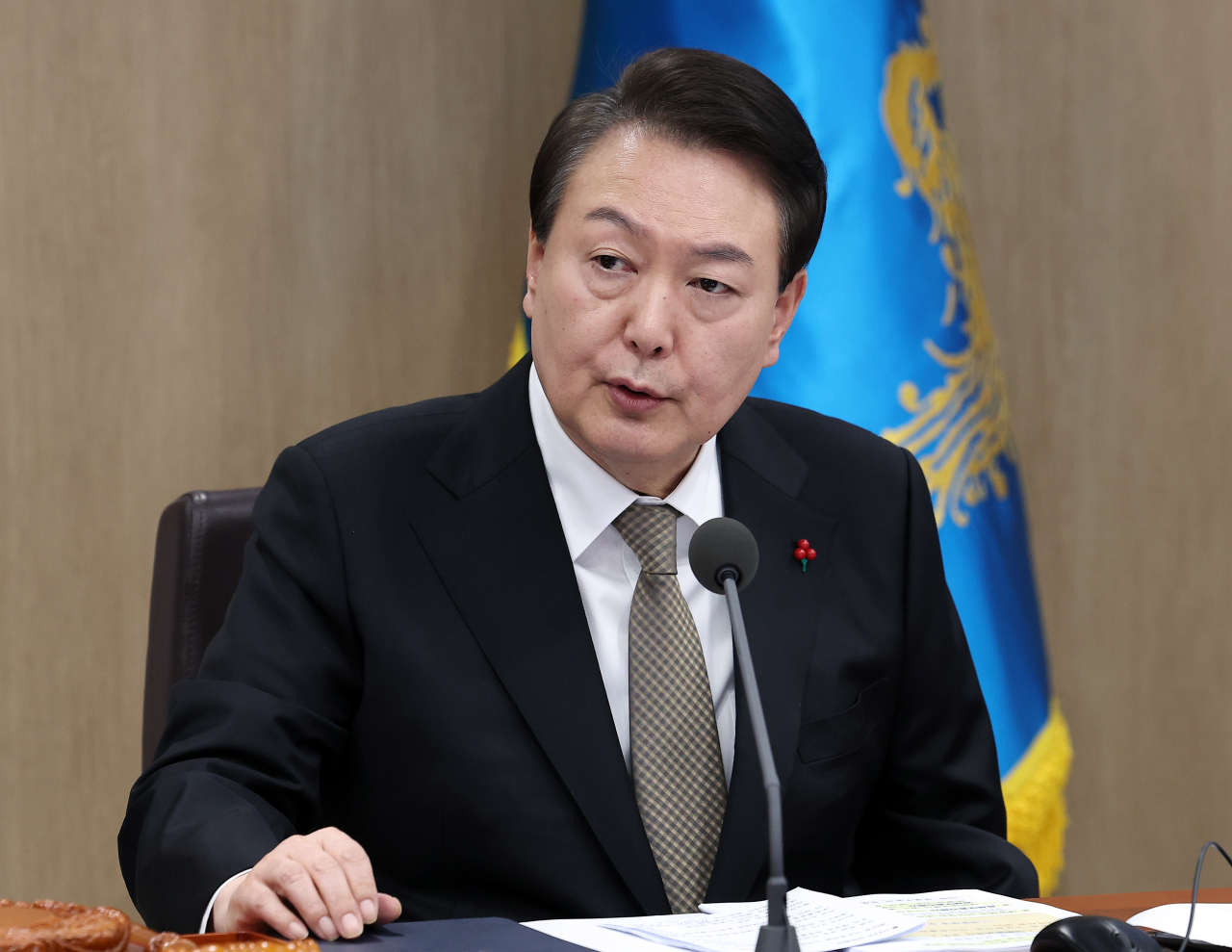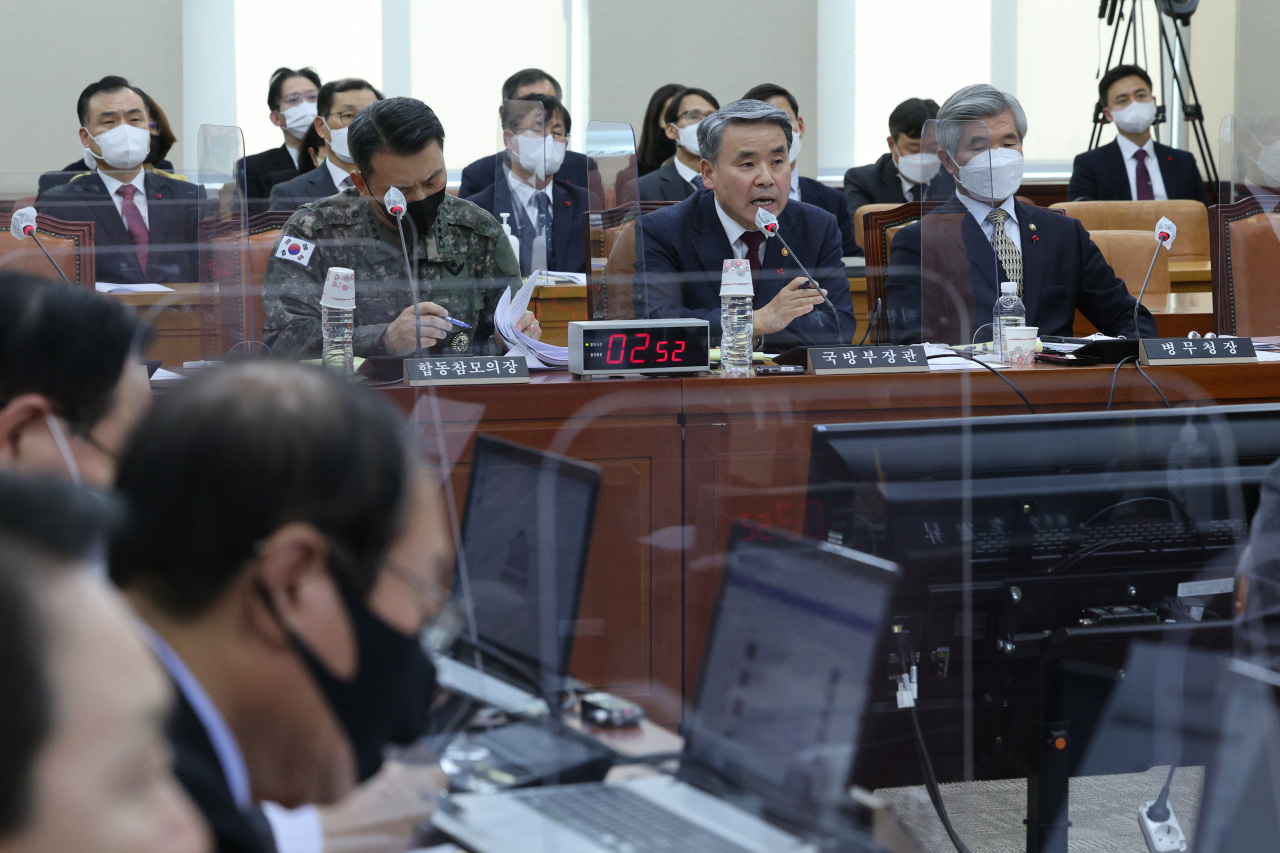Yoon orders immediate retaliation against N.Korean provocations
By Ji Da-gyumPublished : Dec. 28, 2022 - 18:14

Speaking at a meeting with aides, Yoon said that immediate retaliation is the “most powerful means to deter provocations,” according to Kim Eun-hye, senior presidential secretary for press affairs, at a televised press briefing. “We must not fear or hesitate just because the country has nuclear weapons.”
Yoon’s comments came hours after the South Korean presidential office belatedly disclosed that Yoon ordered the South Korean military to take swift corresponding measures against the cross-border offensive, while blasting insufficient anti-drone capabilities despite North Korea’s history of sending uncrewed aerial vehicles for reconnaissance activities.
“When the first one crossed the border, the president ordered us to immediately take corresponding measures against North Korea, saying that we also have unmanned aerial vehicles,” a senior presidential official — who wished to remain anonymous — told a closed-door briefing. “He ordered us to dispatch two or three unmanned aerial vehicles in response to the one from North Korea.”
Five North Korean uncrewed aerial vehicles, or UAVs, on Monday intruded into South Korean airspace for the first time since 2017 and flew over Seoul and residential areas along the western inter-Korean border. But the South Korean military failed to bring down any of the UAVs.
In a tit-for-tat action, the South Korean military on Monday afternoon sent crewed and uncrewed reconnaissance aerial vehicles to the area in the vicinity of and north of the military demarcation line. South Korea’s aerial vehicles flew north as far as North Korean UAVs intruded into South Korea and filmed key North Korean military facilities.
South Korean Defense Minister Lee Jong-sup also admitted that Yoon ordered him to dispatch the aerial vehicles to North Korea while being “prepared for entering war” during an emergency parliamentary briefing on Wednesday afternoon.
“But I’d like to clarify that it does not mean that we have the intention to wage war. Such expression rather shows our goal to deter provocations with such (strong) determination,” Lee told lawmakers. “If we hesitate about taking countermeasures with concern about entering war, we can never break (North Korea’s) will to make provocations.”
Lee also said the military will “aggressively conduct counteroperations if need be,” repeatedly underlining that South Korea cannot unilaterally adhere to the Sept. 19 military tension reduction agreement.

“Five drones came down, but we were unable to shoot down any of them. The president, as the commander in chief of the country’s armed forces, should have something to say,” Rep. Sul Hoon said. “The president should apologize.”
Rep. Kim Young-bae pointed out that Yoon held a year-end party with local government officials while neglecting to hold a briefing on the intrusion of North Korean UAVs on Monday.
Kim criticized the presidential office for not holding a meeting of the National Security Council, pointing out that a meeting is needed to “assess the security situation and come up with measures to reassure people.”
But speaking at the closed-door briefing, the senior presidential official on Wednesday explained that it assessed it would be more effective to hold a military-oriented meeting and come up with countermeasures.
“It was not a situation to hold an NSC meeting and it was not even needed,” the official said.
The official underscored that Yoon frequently issued orders to national security adviser Kim Sung-han during a closed-door briefing. Defense Minister Lee also conveyed Yoon’s orders to the Joint Chiefs of Staff in charge of five-hour military operations to counter the intrusion of five North Korean drones into South Korean airspace on Monday.
The presidential office said it assessed the infiltration of North Korean UAVs and discussed how to respond to the cross-border aerial offensive by holding an emergency security meeting Tuesday morning.
The presidential office’s overdue explanation came hours after South Korea’s state-funded Yonhap News Agency first reported that Yoon harshly rebuked the South Korean defense minister for failing to shoot down any of the five North Korean UAVs during the emergency security meeting.
“How can none have been prepared against North Korean drone attacks? There were similar cases in the past. But what have you done so far?” Yoon reportedly told Lee, according to one unnamed official. “Are you saying that the military has not properly conducted training exercises and that you have done nothing?”
Speaking at the Cabinet meeting, Yoon on Tuesday blasted the military for not conducting related training exercises to counter threats emanating from North Korean UAVs and for insufficient efforts to develop such capabilities.
South Korea’s JCS later in the day issued a public apology for its failure to shoot down the UAVs and laid out plans to reinforce anti-drone capabilities.
The Defense Ministry on Wednesday announced that it will allocate 560 billion won ($442 million) from 2023 to 2027 to carry out four major projects, including the development and deployment of anti-drone laser weapons, to enhance counter-drone capabilities in its five-year defense plan. The military also proposed 331.4 trillion won in total for the five-year period.
The military seeks to develop and deploy detection assets and hard kill and soft kill systems to tackle UAVs, officials said during a closed-door briefing. "Hard kill" refers to physical attacks on enemy UAVs, while a "soft kill" utilizes nonkinetic electronic countermeasures to disrupt or jam communications and signals of UAVs.







![[KH Explains] Hyundai's full hybrid edge to pay off amid slow transition to pure EVs](http://res.heraldm.com/phpwas/restmb_idxmake.php?idx=644&simg=/content/image/2024/04/18/20240418050645_0.jpg&u=20240419100350)







![[From the Scene] Monks, Buddhists hail return of remains of Buddhas](http://res.heraldm.com/phpwas/restmb_idxmake.php?idx=652&simg=/content/image/2024/04/19/20240419050617_0.jpg&u=20240419175937)

![[KH Explains] Hyundai's full hybrid edge to pay off amid slow transition to pure EVs](http://res.heraldm.com/phpwas/restmb_idxmake.php?idx=652&simg=/content/image/2024/04/18/20240418050645_0.jpg&u=20240419100350)

![[Today’s K-pop] Illit drops debut single remix](http://res.heraldm.com/phpwas/restmb_idxmake.php?idx=642&simg=/content/image/2024/04/19/20240419050612_0.jpg&u=)